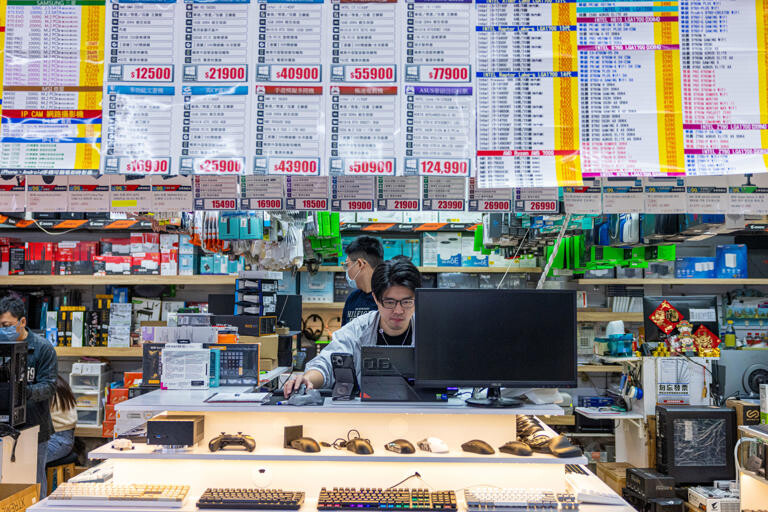
Taipei, Taiwan - US President Donald Trump's unpredictable trade policies are sending shockwaves through Taiwan. A recently announced 32% tariff on Taiwanese exports to the United States, excluding computer chips, has triggered significant unease across the island's economy. Adding to the alarm, President Trump reportedly floated the idea of imposing a staggering 100% tariff on Taiwan Semiconductor Manufacturing Co. (TSMC) in private conversations, stunning the Taiwanese government and business community.
While President Trump offered a seemingly conciliatory gesture on Wednesday by reducing the tariff rate on Taiwanese goods to 10%, the erratic signals from the US have left Taiwan deeply unsettled. This is particularly acute for Taiwan, which relies heavily on US support in the face of growing military and political pressure from China.
"In the past, we believed that Taiwan and the United States shared similar values of democracy and human rights, and therefore Taiwan would be safe," said Huang Kwei-bo, associate professor of diplomacy at National Chengchi University in Taiwan. "But now, it doesn't seem so simple." He pointed out that Taiwan cannot afford to antagonize both Beijing and Washington simultaneously, especially with China's threats escalating.
China considers Taiwan, a democratic nation of 23 million people, as its own territory and has intensified its pressure, including conducting large-scale military exercises near the island, simulating a blockade. Taiwan relies on political support and military equipment from the US under its policy of "strategic ambiguity" – a deliberate vagueness on whether the US would intervene if China were to attempt to take the island by force.
While a US Department of Defense memo last month appeared to reassure Taiwan by prioritizing the deterrence of a Chinese invasion, President Trump's transactional approach, demands for increased Taiwanese defense spending, and the temporary halt of aid to Ukraine have fueled doubts about the reliability of US support.
In response to the tariff fallout, the Taiwanese government is scrambling to manage the repercussions. President Lai Ching-te, in a video message on Sunday, stated that Taiwan would prioritize negotiations with Washington rather than imposing retaliatory tariffs. The government also announced a $2.7 billion support package for affected industries, including the industrial and agricultural sectors. "This tariff has exceeded a reasonable level and is extremely unfair to us. We express our deep regret," Vice Premier Cheng Li-chiun told a press conference.
Meanwhile, President Trump's trade war is inflicting even more severe damage on China, with tariffs on Chinese imports to the US soaring to at least 104%. While this will negatively impact the Chinese economy, some analysts suggest it could paradoxically present a geopolitical opportunity for China to position itself as a more reliable trading partner to countries worldwide, including Taiwan.
"The tariffs, in the short term, will not change the Lai Ching-te government's hard-line policy towards China, but they are raising questions within Taiwan about whether cross-strait economic ties are really that dangerous," noted Professor Huang. He added, "When it comes to trade, the Trump administration seems much tougher than Beijing. Skepticism towards the US has definitely grown in recent months."
Taiwan is heavily reliant on trade with the United States. Last year, Taiwanese exports to the US surged by 46% year-on-year to $111 billion. Key exports include servers and computer components, with 60% of all computer component exports destined for the US. This surge is attributed to the US artificial intelligence (AI) boom and the relocation of many Taiwanese companies from China to the US during the US-China trade war in Trump's first term. The Taiwanese administration argued last week that this trend has actually "made a significant contribution to the US economy and national security" and that Taiwan should not be subject to tariffs.
The new Trump tariffs notably exclude semiconductors, an area where Taiwan dominates global supply chains, producing approximately 90% of the world's most advanced chips. President Trump has previously accused Taiwan of "stealing America's chip business." In an apparent effort to appeal to a potential new administration, TSMC pledged $100 billion in expanded US operations last month.
However, it remains uncertain whether the exemption for semiconductors will prevent indirect impacts across the semiconductor supply chain. Many chips are not directly exported from Taiwan to the US but are integrated into other tech products or shipped to other countries for assembly into laptops and other devices. In 2024, only 5% of Taiwan's chip exports went directly to the US.
"The semiconductor exemption is not really effective," said Ho Ming-yen, a researcher at the government-backed Institute for National Defense and Security Research in Taipei. "A single chip can travel to many countries for manufacturing, packaging, and assembly." Experts warn that increased costs throughout the tech supply chain could hinder the development of advanced AI systems in the US amid intense technological competition with China.
"Taiwan is a vital source of technological innovation for the United States and the world," said Dan Silver, chairman of the American Chamber of Commerce in Taiwan. "We are concerned that these tariffs risk increasing the cost of innovation at a time of heightened geopolitical competition."
In addition to TSMC's US investments, the Taiwanese government signaled its intention in March to increase purchases of US liquefied natural gas (LNG). In his Sunday address, President Lai also mentioned increasing procurement of US goods, including additional purchases of US military equipment, to reduce the trade deficit with the United States.
"By increasing tariffs, the US hopes to bring other countries to the negotiating table and increase their purchases of US goods and services," said Lien Hsien-ming, director of the Taiwan Institute of Economic Research, a Taipei-based think tank. "For Taiwan, natural gas and defense weapons will be key areas."
[Copyright (c) Global Economic Times. All Rights Reserved.]






























